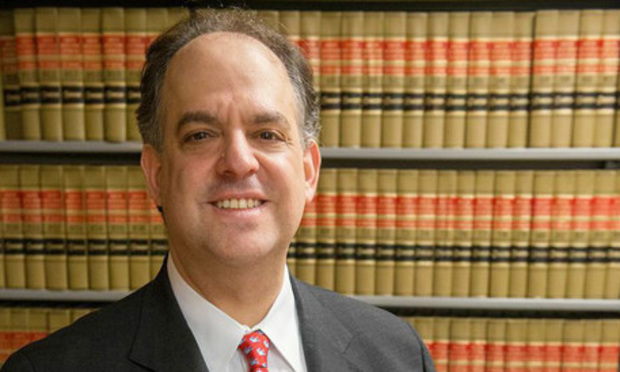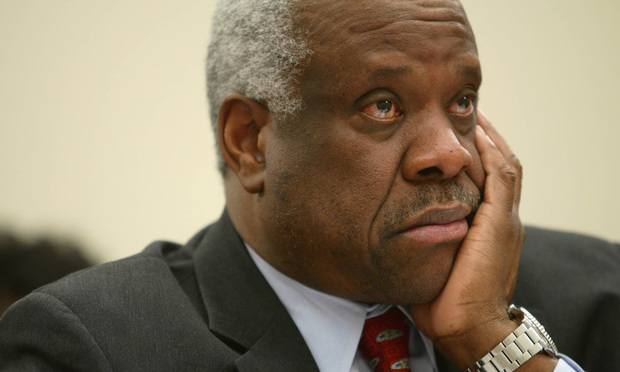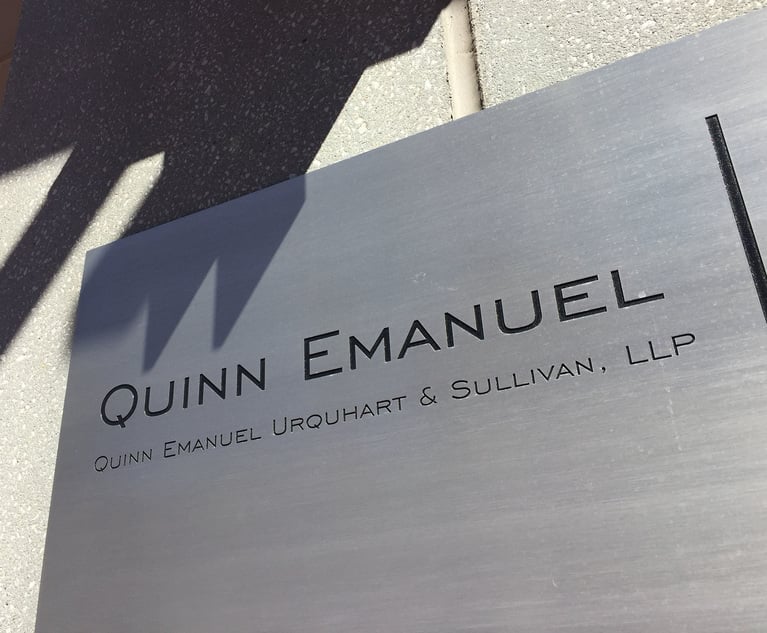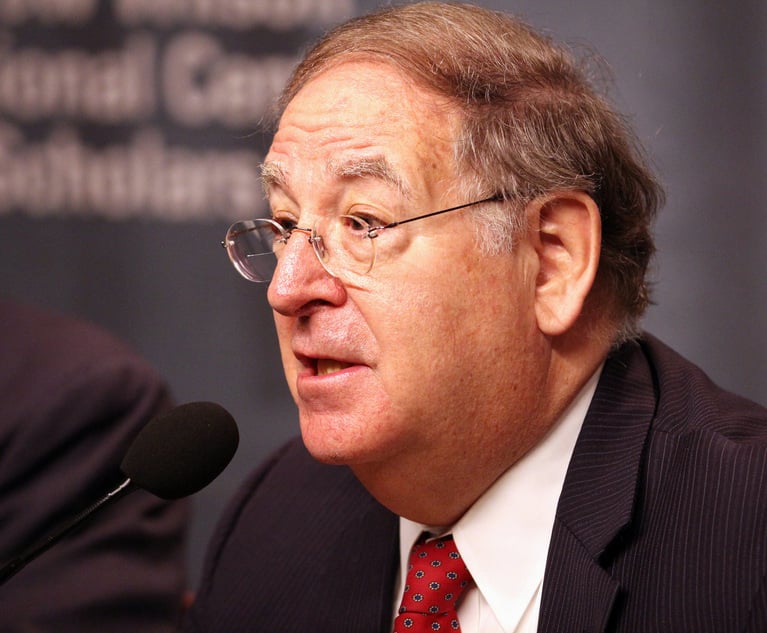Justices Punt on Google 'Cy Pres' Settlement Amid Standing Questions
"We conclude that the case should be remanded for the courts below to address the plaintiffs' standing in light of Spokeo," the justices said. Justice Clarence Thomas, in dissent, would have reached the merits and vacated the settlement.
March 20, 2019 at 10:24 AM
5 minute read
 Ted Frank, Center for Class Action Fairness (Courtesy photo)
Ted Frank, Center for Class Action Fairness (Courtesy photo)
The U.S. Supreme Court on Wednesday stopped short of prohibiting a form of class action settlements in which funds awarded go to unrelated third parties and lawyers but not to the parties making claims.
The justices in Frank v. Gaos, which involved an $8.5 million internet privacy settlement with Google, did not address the legality of class settlements featuring only “cy pres” funds going to third-party groups and organizations and not to plaintiffs.
Instead, the high court, in an unsigned per curiam opinion, vacated and remanded the case to the U.S. Court of Appeals for the Ninth Circuit to consider whether the plaintiffs had “standing” to assert their claim in light of the justices' 2016 decision in Spokeo v. Robins.
In Spokeo, the high court held that standing requires a concrete injury even in the context of a statutory violation. In Gaos, the alleged statutory violation involved the Stored Communications Act.
After arguments in October, during which the standing issue dominated the justices' questions, the court ordered both sides to file briefs on that issue. U.S. Solicitor General Noel Francisco originally raised the question in the government's amicus brief. He also charged that “cy pres relief has little basis in history, creates incentives for collusion, and raises serious questions under Article III.”
The high court said the supplemental briefs raised “a wide variety of legal and factual issues” which were not addressed in the briefing on the merits or at oral argument.
“We 'are a court of review, not of first review,'” the high court said. “Nothing in our opinion should be interpreted as expressing a view on any particular resolution of the standing question.”
Justice Clarence Thomas, voting in dissent, would have reversed the settlement.
 Justice Clarence Thomas, U.S. Supreme Court. (Phoro: Diego M. Radzinschi / ALM)
Justice Clarence Thomas, U.S. Supreme Court. (Phoro: Diego M. Radzinschi / ALM)“Because the class members here received no settlement fund, no meaningful injunctive relief, and no other benefit whatsoever in exchange for the settlement of their claims, I would hold that the class action should not have been certified, and the settlement should not have been approved,” Thomas wrote.
Google was sued in 2010 for allegedly violating the federal act by sharing the search queries of its users with third parties for commercial purposes. Google settled the suit with the bulk of the money going to six organizations. Attorneys for the class received $2.1 million of the $8.5 million total.
The Ninth Circuit in August 2017 affirmed the district court's approval of the settlement and the trial judge's finding that the settlement fund was not distributable to a class of an estimated 129 million Google users.
The Ninth Circuit panel said distributing the settlement money would result in each class member receiving about 4 cents, “a de minimus amount if ever there was one.”
The settlement directed the funds to be distributed proportionally to six recipients that are devoted to web privacy: Carnegie-Mellon University; World Privacy Forum; Chicago Kent College of Law Center for Information, Society, and Policy; Stanford Law School Center for Internet and Society; Berkman Center for Internet & Society at Harvard University; and AARP Foundation.
Ted Frank, director of litigation for the Center for Class Action Fairness at the Hamilton Lincoln Law Institute, and Melissa Ann Holyoak, the institute's president and general counsel, were objectors to the settlement in the district court and in the Ninth Circuit.
In October, Frank, arguing pro se for the first time in the high court, found several justices sympathetic to his arguments that the cy pres-only settlement was unfair and inadequate.
“How can you say this makes any sense?” Justice Samuel Alito Jr. asked at one point. “At the end of the day, what happens? The attorneys get money, and a lot of it. The class members get no money whatsoever.”
Justice Brett Kavanaugh said those settlements raise “the appearance of favoritism and collusion.”
But Justice Ruth Bader Ginsburg said, “Practically, the class members would get nothing, nothing at all, and here at least they get an indirect benefit.”
Cy pres critics claim it has become a common litigation tactic, but an amicus brief by Harvard Law's William Rubenstein said only 18 cy pres-only settlements have been approved by federal courts in the last 20 years.
Mayer Brown partner Andrew Pincus argued on behalf of Google. MoloLamken partner Jeffrey Lamken argued for Paloma Gaos.
Read the opinion in Frank v. Gaos:
Read more:
Justices Frown on Cy Pres Settlements, but Fate Is Uncertain
DOJ Tells Court: Class Lawyers Already Got $60M in Fees. Now They Want More?
US Supreme Court Finally Takes a 'Cy Pres' Case, and This One Involves Google
This content has been archived. It is available through our partners, LexisNexis® and Bloomberg Law.
To view this content, please continue to their sites.
Not a Lexis Subscriber?
Subscribe Now
Not a Bloomberg Law Subscriber?
Subscribe Now
NOT FOR REPRINT
© 2025 ALM Global, LLC, All Rights Reserved. Request academic re-use from www.copyright.com. All other uses, submit a request to [email protected]. For more information visit Asset & Logo Licensing.
You Might Like
View All
Skadden and Steptoe, Defending Amex GBT, Blasts Biden DOJ's Antitrust Lawsuit Over Merger Proposal
4 minute read
Quinn Emanuel Files Countersuit Against DOJ in Row Over Premerger Reporting
3 minute read
Read the Document: DOJ Releases Ex-Special Counsel's Report Explaining Trump Prosecutions
3 minute read
'Thoughtful Jurist': Maryland US District Senior Judge Messitte Dies After Short Illness
4 minute readTrending Stories
- 1Democracy in Focus: New York State Court of Appeals Year in Review
- 2In Vape Case, A Debate Over Forum Shopping
- 3SDNY Criminal Division Deputy Chief Returns to Debevoise
- 4Brownstein Adds Former Interior Secretary, Offering 'Strategic Counsel' During New Trump Term
- 5Tragedy on I-95: Florida Lawsuit Against Horizon Freight System Could Set New Precedent in Crash Cases
Who Got The Work
J. Brugh Lower of Gibbons has entered an appearance for industrial equipment supplier Devco Corporation in a pending trademark infringement lawsuit. The suit, accusing the defendant of selling knock-off Graco products, was filed Dec. 18 in New Jersey District Court by Rivkin Radler on behalf of Graco Inc. and Graco Minnesota. The case, assigned to U.S. District Judge Zahid N. Quraishi, is 3:24-cv-11294, Graco Inc. et al v. Devco Corporation.
Who Got The Work
Rebecca Maller-Stein and Kent A. Yalowitz of Arnold & Porter Kaye Scholer have entered their appearances for Hanaco Venture Capital and its executives, Lior Prosor and David Frankel, in a pending securities lawsuit. The action, filed on Dec. 24 in New York Southern District Court by Zell, Aron & Co. on behalf of Goldeneye Advisors, accuses the defendants of negligently and fraudulently managing the plaintiff's $1 million investment. The case, assigned to U.S. District Judge Vernon S. Broderick, is 1:24-cv-09918, Goldeneye Advisors, LLC v. Hanaco Venture Capital, Ltd. et al.
Who Got The Work
Attorneys from A&O Shearman has stepped in as defense counsel for Toronto-Dominion Bank and other defendants in a pending securities class action. The suit, filed Dec. 11 in New York Southern District Court by Bleichmar Fonti & Auld, accuses the defendants of concealing the bank's 'pervasive' deficiencies in regards to its compliance with the Bank Secrecy Act and the quality of its anti-money laundering controls. The case, assigned to U.S. District Judge Arun Subramanian, is 1:24-cv-09445, Gonzalez v. The Toronto-Dominion Bank et al.
Who Got The Work
Crown Castle International, a Pennsylvania company providing shared communications infrastructure, has turned to Luke D. Wolf of Gordon Rees Scully Mansukhani to fend off a pending breach-of-contract lawsuit. The court action, filed Nov. 25 in Michigan Eastern District Court by Hooper Hathaway PC on behalf of The Town Residences LLC, accuses Crown Castle of failing to transfer approximately $30,000 in utility payments from T-Mobile in breach of a roof-top lease and assignment agreement. The case, assigned to U.S. District Judge Susan K. Declercq, is 2:24-cv-13131, The Town Residences LLC v. T-Mobile US, Inc. et al.
Who Got The Work
Wilfred P. Coronato and Daniel M. Schwartz of McCarter & English have stepped in as defense counsel to Electrolux Home Products Inc. in a pending product liability lawsuit. The court action, filed Nov. 26 in New York Eastern District Court by Poulos Lopiccolo PC and Nagel Rice LLP on behalf of David Stern, alleges that the defendant's refrigerators’ drawers and shelving repeatedly break and fall apart within months after purchase. The case, assigned to U.S. District Judge Joan M. Azrack, is 2:24-cv-08204, Stern v. Electrolux Home Products, Inc.
Featured Firms
Law Offices of Gary Martin Hays & Associates, P.C.
(470) 294-1674
Law Offices of Mark E. Salomone
(857) 444-6468
Smith & Hassler
(713) 739-1250










